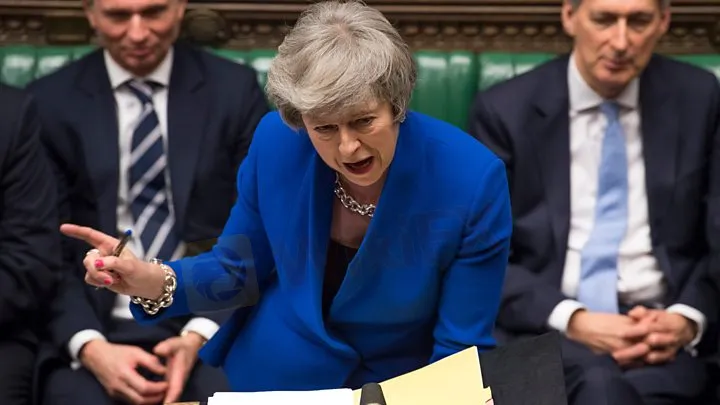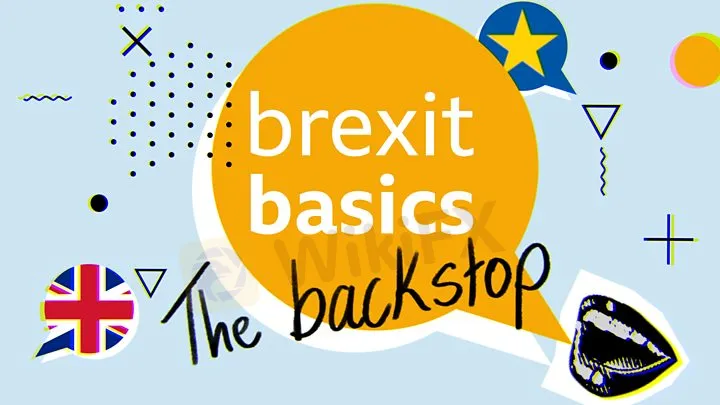简体中文
繁體中文
English
Pусский
日本語
ภาษาไทย
Tiếng Việt
Bahasa Indonesia
Español
हिन्दी
Filippiiniläinen
Français
Deutsch
Português
Türkçe
한국어
العربية
Brexit: MPs preparing to vote on amendments to PM's deal
Abstract:Media playback is unsupported on your device Media captionChris Mason recaps what has happened to

Media playback is unsupported on your device
Media captionChris Mason recaps what has happened to the Brexit deal and explains the next key vote optio
MPs are preparing to vote on amendments to Theresa May's Brexit deal that could shape the next stage of negotiations with the EU.
Conservative MPs have been told to back a proposal for an alternative to the Irish backstop - the insurance policy against the return of a hard border.
But it is not yet known which amendments will be chosen for a vote.
Meanwhile, Conservative MPs on both sides of the Brexit argument have been planning for a no-deal scenario.
Brexit: A really simple guide
A guide to MPs' Brexit amendment
Laura Kuenssberg: Will MPs find agreement in their plans?
No-deal 'redeployment' for defence staff
MPs have been tabling amendments to the government's plans to try to influence the direction of Brexit since Mrs May lost the vote on her original deal earlier this month.
Speaker John Bercow is to decide which amendments are put forward and voting will take place in the Commons from 19:00 GMT.
The prime minister's official spokesman said it will be followed “as soon as possible” by a second meaningful vote on whatever deal has been secured with Brussels.
Image copyrightEPA. ReutersImage caption Nicky Morgan and Jacob Rees-Mogg are said to have been working on the no-deal pla
But BBC political correspondent Iain Watson said Tory MPs on both sides of the argument are starting to draw up more alternatives, in case no progress can be made and the UK leaves the EU without a deal.
Former Remainers, including ex-Education Secretary Nicky Morgan and government ministers Stephen Hammond and Rob Buckland, have been working with Brexiteers Jacob Rees-Mogg and Steve Baker on the plan.
According to a leaked document, the proposal drawn up by the rival factions would extend the transition period where the UK would continue to follow EU rules and pay into its budget from the end of 2020 and into December 2021, which would allow time to reach a free trade deal.
EU citizens rights would be guaranteed during this time and there would be no customs checks on the Irish border.
Will MPs find agreement in their plans?
Image copyrightEPA
By Laura Kuenssberg, political editor
“It might not be 326 that matters”.
According to one cabinet minister, that's the strange situation that Brexit has led us to.
The government's ambition is so low - or its hurdles so high - that what No 10 seeks to do on Tuesday is not to win (326 is a majority in the House of Commons), but to reduce the scale of resistance to their central policy that, in the words of another cabinet minister, only the “hardliners oppose”, so that Theresa May can get the rebels down to a “few dozen”, so then they can crack on.
Read more from Laura
Mrs May took the deal she had negotiated with the EU to Parliament on 15 January for a “meaningful vote” - having delayed it from December - but MPs rejected it by 432 votes to 202.
She addressed a meeting of her backbench MPs on Monday night and numerous sources said she would be backing what is known as the “Brady amendment” - a measure put forward by Sir Graham Brady, the chairman of the backbench 1922 committee of Conservative MPs.
Image caption A leaked document outlines potential scenarios in a no-deal situatio
Sir Graham wants to see the Irish backstop replaced by what he calls “alternative arrangements to avoid a hard border”, but would otherwise support the prime minister's deal.
Senior EU representatives have repeatedly ruled out reopening negotiations with the UK over Brexit, and have insisted the backstop - the insurance policy against a return of a hard border between Ireland and Northern Ireland - must be included in any deal.
And Eurosceptic Tories have already said they will not back the amendment.
Quick guide: What is a no-deal Brexit?
A “no-deal” Brexit is where the UK would cut ties with the European Union overnight without a transition period.
Theresa May's government, and many others, believe this would be hugely damaging and want a more gradual withdrawal. But if Parliament can't agree on that, and nothing else takes its place, the UK will leave without a deal.
This would mean the UK would not have to obey EU rules. Instead, it would need to follow World Trade Organization terms on trade. Many businesses would see new taxes on imports, exports and services, which are likely to increase their operating costs. That means the prices of some goods in UK shops could go up.
The UK would also lose the trade agreements it had with other countries as a member of the EU, all of which would need to be renegotiated alongside the new agreement with the EU itself.
Manufacturers in the UK expect to face delays in components coming across the border.
The UK would be free to set its own immigration controls. However some UK professionals working in the EU and UK expats could face uncertainty until their status was clarified. The European Commission has said that even in a no-deal scenario, UK travellers won't need a visa for short visits of up to 90 days.
The border between Northern Ireland and the Irish republic would become an external frontier for the EU with customs and immigration controls, though how and where any checks would be made is not clear.
Some Leave supporters think that leaving without a deal would be positive if the right preparations were made. They say criticism is scaremongering and any short term pain would be for long term gain.
But critics - including both Brexit supporters and opponents - say that leaving without a deal would be a disaster for the UK: driving up food prices, leading to shortages of goods and gridlock on some roads in the South East resulting from extra border checks.
The European Research Group, led by Mr Rees-Mogg, said they want the government to table its own amendment that would commit to reopening the withdrawal agreement - the part of Mrs May's deal that lays out how the UK will leave the EU - to remove the backstop.
Mrs May has also faced calls from Labour, and a number of other MPs, to rule out the scenario in which the UK leaves the EU on 29 March without a deal.
A number of Remain-backing MPs are supporting an amendment by Labour MP Yvette Cooper that would create a bill enabling Article 50 - the mechanism by which the UK leaves the EU - to be delayed by up to nine months if the government does not have a plan agreed in Parliament by the end of February.
The debate will be the first in which MPs on parental leave will be able to nominate another MP to vote on their behalf after the Commons unanimously chose to implement a year-long trial of proxy voting. Labour's Tulip Siddiq, who delayed giving birth to attend the Brexit-deal vote on 15 January, is set to be the first person to benefit from the move.

Media playback is unsupported on your device
Media captionConfused by Brexit jargon? Reality Check unpacks the basic
Meanwhile, the government has announced its plans for EU citizens coming to the UK in the case of a no-deal Brexit, saying it would “seek to end free movement as soon as possible”.
The Home Office said that for a “transitional period” after Brexit - set for 29 March - EU citizens will be able to enter the UK to visit, work or study as they do now, but after three months they would need to apply for “European Temporary Leave to Remain”, which would last three years.
Home Secretary Sajid Javid said it was a “practical approach” and would “minimise disruption to ensure the UK stays open for business”.
Disclaimer:
The views in this article only represent the author's personal views, and do not constitute investment advice on this platform. This platform does not guarantee the accuracy, completeness and timeliness of the information in the article, and will not be liable for any loss caused by the use of or reliance on the information in the article.
WikiFX Broker
Latest News
BI Apprehends Japanese Scam Leader in Manila
Bitcoin in 2025: The Opportunities and Challenges Ahead
Join the Event & Level Up Your Forex Journey
Is There Still Opportunity as Gold Reaches 4-Week High?
Bitcoin miner\s claim to recover £600m in Newport tip thrown out
Good News Malaysia: Ready for 5% GDP Growth in 2025!
How to Automate Forex and Crypto Trading for Better Profits
Breaking News! Federal Reserve Slows Down Interest Rate Cuts
Beware: Pig Butchering Scam Targeting Vulnerable Individuals
This Economic Indicator Sparks Speculation of a Japan Rate Hike!
Currency Calculator






